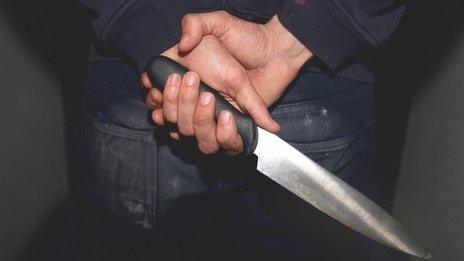Education 'key' to Scotland's knife crime battle, study suggests
- Published

The study says young people need credible warnings on the consequences of knife carrying
Longer jail terms for carrying a knife will be less effective unless they are accompanied by effective education, research has suggested.
There are plans to increase the maximum sentence for carrying a knife in Scotland from four to five years.
The study suggests enforcement should also be backed by assurances police are working to protect young people and careful use of stop and search powers.
It was carried out by the Scottish Centre for Crime and Justice Research.
'Essential role'
The report states: "Some scholars have expressed reservations over the effectiveness of increased custodial sentences, suggesting that those who carry knives tend to be young people who are less likely to foresee both the short-term and long-term consequences of their actions."
It adds: "Evidently, education has an essential role in reassuring young people that carrying knives is unnecessary. Indeed, it may be the only way in which fears can be addressed, and the only way in which knife-related crime can be reduced amongst those who perpetrate it as a result of fear."
The study's author Rebecca Foster told BBC Radio Scotland's Good Morning Scotland programme: "Carrying a knife actually increases your risk of being victimised, it's bringing danger into an environment that doesn't need to be there.
"So if you emphasise that a knife will not protect you - will actually do more harm than good - and that's really drummed into young people and you've got people who have directly experienced knife crime and therefore believable, not just some person who doesn't know what they're talking about, then it's hoped that this can convey the message."
Stop and search has more than doubled in recent years and the report also cautioned that this may exacerbate and create tensions and feelings of mistrust.
Culture change
The research was commissioned by the Scottish government and a government spokesman said education and prevention were key to reducing knife crime.
He added: "This is why we fund the No Knives Better Lives youth initiative, that works with local partners to deliver a range of activities in schools and communities to get the message across to young people about the dangers and consequences of carrying a knife, encouraging young people to make more positive life choices.
"Our priority is to change the culture in which some young people think that carrying a knife is acceptable."
Jane Dailly, national co-ordinator at the No Knives Better Lives national delivery team, said: "The findings of the report support the key principles of No Knives Better Lives - that education and prevention is key to reducing knife crime.
"No Knives aims to reduce the incidence of knife-carrying amongst young people in Scotland by raising awareness of the related risks and consequences, changing attitudes and perceptions, and promoting positive life choices."
- Published23 April 2013
- Published1 March 2013
- Published2 February 2013
- Published3 December 2012
- Published1 December 2012